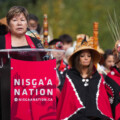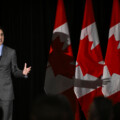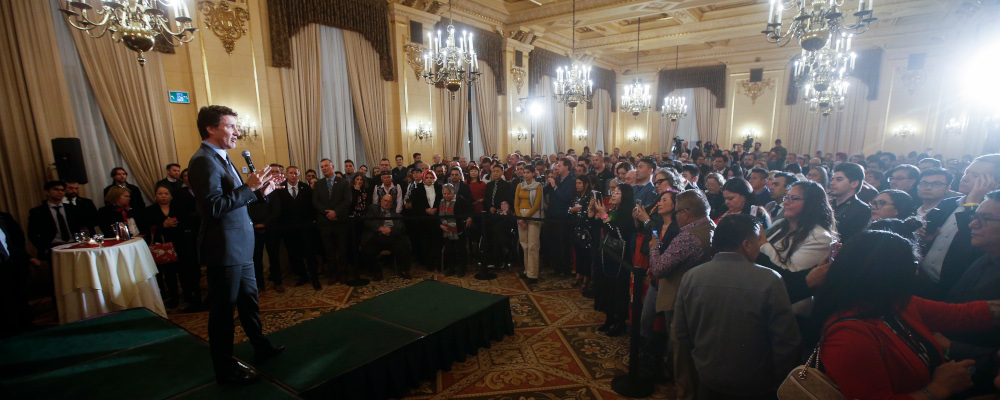American conservative pundit Jonah Goldberg set off a small online skirmish this past August when he said in a CNN interview: “…small donors are one of the biggest problems for democracy, for the GOP. Because…large donors actually have a strategic view about moderation, who can win, who can’t. Small donors really are just venting their spleen with their credit card.” It’s not just Goldberg bemoaning the influence of small-donor fundraising strategy on our body politic. Canadian writer Justin Ling published a paper this year with the Public Policy Forum attributing our troubling political polarization, in part, to the same phenomenon.
Indeed, small-donor fundraising is an increasingly powerful force in Canadian politics, not only because it’s proven to be an effective strategy for those who excel at it, but because changing rules and norms at the federal level have made it a political necessity. But Goldberg, Ling, and other critics are wrong. Not only is the small-donor approach far preferable to the clearly less democratic alternative of our recent past (and sometimes present) where wealthy donors exchange money for influence, but its relationship to principled politics makes it a better bulwark against corruption than any ethical rule or guideline.
In Canada, we can analyze different fundraising cultures in real time because we’ve got both. First, let’s consider the federal dynamic. An elite-driven fundraising strategy, which targets corporate donations, major donations from wealthy individuals, or both, was the driving force in federal Canadian politics until very recently. It wasn’t so long ago that Canada’s corporate power brokers had ready access to whatever major political party was in power—the Liberals at the peak of this period—and in exchange, those same major donors would fund the party’s next election campaign. It’s not that regular people didn’t donate to political parties, it’s just that their donations made very little difference. Parties courted wealthy donors, and it was understood that if you won power, you would make it a priority to return those donor’s phone calls. Canadians mostly put up with this. After all, institutional trust was high, and a returned phone didn’t necessarily result in a favour paid. But after years of grift, the sponsorship scandal was the straw that broke the camel’s back, and as conservative populists channeled anti-Laurentian sentiment into a new political movement, the Liberals struggled to adapt.
Stephen Harper understood that Conservatives would need to draw a line in the sand to match a new demand for ethical behaviour between politicians and those who sought to influence them. His government brought in various democratic reforms, including a Federal Accountability Act, which, from a policy perspective, continues to make it harder for elected officials to dole out access in exchange for favours.
But that wasn’t all. The Conservatives understood that changing laws and regulations wouldn’t be enough. Canadian politics needed a culture shift. The Chrétien Liberals (responding to political pressure) had recently changed fundraising rules to prohibit corporate and union donations at the federal level, but political parties were still thinking about fundraising in terms of “stakeholder relations” (i.e., what private interest is likely to donate the maximum amount allowable in order to get close to my party and a potential future government?). Harper’s fundraising strategy set out to change that by trying to raise smaller amounts of money from way more people. In charting a two-step path to a majority government, Conservatives learned to play a volume game. It’s not that some wealthy Canadians wouldn’t donate the maximum amount, but fundraising success ultimately came from thousands and thousands of small donations from regular Canadians, in Goldberg’s words “venting their spleens”.
Harper’s success became Trudeau’s, who understood he couldn’t leap from third party to government without mimicking the Conservative party’s modernization efforts. In fact, by the time they beat Harper’s Conservatives, the Liberals were beating the Tories at their own game, taking small donations digital. A decade late, Pierre Poilievre has outmatched them all, bringing together principled policy commitments, compelling communication, and digital engagement in a potent fundraising offence, blowing other parties out of the water.
The federal shift in fundraising culture was not inevitable. Indeed, Canada’s biggest province took a darker path. While Harper was bringing in democratic reform, Ontario Liberals were learning that big labour had as much money to throw around as big business did. The Working Families Coalition, a group of Ontario’s public sector unions, contributed millions not just to Ontario Liberal party war room budgets but on third-party advertising campaigns too, helping first to defeat Ernie Eves and then to keep the Liberals in power for a decade. During that time, public sector unions negotiated the best compensation and benefit deals they had had in years.
By the end of McGuinty’s tenure, even he was growing concerned about the province’s finances, so while some union donations continued to flow, the Liberal cabinet was instructed to meet tough fundraising targets, not by appealing to regular people, but by hosting events with big donors. Eventually, embroiled in a cash-for-access scandal during Kathleen Wynne’s tenure as premier, the government was forced to change Ontario law, banning corporate and union donations. This could have been an important turning point.
Unfortunately, the Ontario PC leader at the time, Patrick Brown, opted to take advantage of a “loophole” in the new legislation, keeping up the old fundraising strategy instead of taking the opportunity to break the PC party of its addiction to big donations. A couple of years later, after forming government, the Ontario PCs leaned further into the past, increasing donation limits, and allowing MPPs to attend their own fundraisers once again.

Now, the provincial government is facing down its own version of a cash-for-access scandal, and as the Ontario Liberals try to rebuild, leadership frontrunner Bonnie Crombie is bragging to members about her fundraising chops—not because she has a compelling, ideological vision for Ontario which motivates individuals to scrape together some of their hard-earned cash and donate, but because developers and other corporate interests think she has the best chance of winning and want to make sure that their business interests are protected under a future Liberal government.
It’s hard to imagine how anyone could prefer the latter political culture to the former, especially if one’s interest is in enhancing democracy. Jonah Goldberg is an otherwise very thoughtful pundit, so I can only attribute his misguided comments to a pattern I’ve observed among similarly wise commentors of a certain age. These critics legitimately lament lost institutional trust and the decaying ethics and intellect of the elite, but instead of questioning what elites did to lose trust, they lash out at the people who won’t grant it.
Justin Ling, and some others who have since commented on his report, tend to recommend a per-vote-subsidy in lieu of a return to big donor strategies. This approach is certainly preferable, but taxing Canadians more to fund political causes they don’t believe in seems like a rash measure given the federal status quo works so well. Critics of small-donor fundraising don’t trust little old ladies and their credit cards to determine whose political success ought to be funded. But if our next prime minister is going to feel he owes something to someone, wouldn’t you prefer it be Agnes from Thunder Bay? Even if she is venting her spleen?
Recommended for You

Crystal Smith and Eva Clayton: Indigenous natural resources development is an efficient, fair, and responsible way to advance economic reconciliation

Peter Menzies: Justin Trudeau’s legislative legacy is still haunting the Liberals

‘There are consequences to this legislation’: Michael Geist on why the Canada-U.S. digital services tax dustup was a long time coming

Rudyard Griffiths and Sean Speer: The future of news in Canada: A call for rethinking public subsidies




